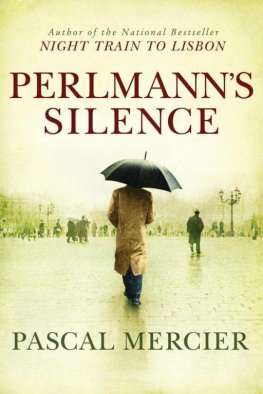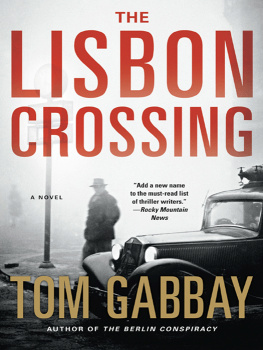Pascal Mercier - Night Train to Lisbon
Here you can read online Pascal Mercier - Night Train to Lisbon full text of the book (entire story) in english for free. Download pdf and epub, get meaning, cover and reviews about this ebook. year: 0, genre: Detective and thriller. Description of the work, (preface) as well as reviews are available. Best literature library LitArk.com created for fans of good reading and offers a wide selection of genres:
Romance novel
Science fiction
Adventure
Detective
Science
History
Home and family
Prose
Art
Politics
Computer
Non-fiction
Religion
Business
Children
Humor
Choose a favorite category and find really read worthwhile books. Enjoy immersion in the world of imagination, feel the emotions of the characters or learn something new for yourself, make an fascinating discovery.
- Book:Night Train to Lisbon
- Author:
- Genre:
- Year:0
- Rating:5 / 5
- Favourites:Add to favourites
- Your mark:
- 100
- 1
- 2
- 3
- 4
- 5
Night Train to Lisbon: summary, description and annotation
We offer to read an annotation, description, summary or preface (depends on what the author of the book "Night Train to Lisbon" wrote himself). If you haven't found the necessary information about the book — write in the comments, we will try to find it.
Night Train to Lisbon — read online for free the complete book (whole text) full work
Below is the text of the book, divided by pages. System saving the place of the last page read, allows you to conveniently read the book "Night Train to Lisbon" online for free, without having to search again every time where you left off. Put a bookmark, and you can go to the page where you finished reading at any time.
Font size:
Interval:
Bookmark:
Rich, dense, star-spangle Night Train to Lisbon is about ends and means, language and loneliness, betrayal and complicity, intimacy and imagination, vanity and forgiveness.
Harpers
Have you ever been overwhelmed by an abrupt impulse to leave your old life behind and start a new one? Many of us feel the temptation; very few give in to it Night Train to Lisbon is a novel of ideas that reads like a thriller: an unsentimental journey that seems to transcend time and space. Every character, every scene, is evoked with an incomparable economy and a tragic nobility redolent of the mysterious hero Pascal Mercier now takes his rightful place among our finest European novelists.
Sunday Telegraph
I heartily recommend [this novel] I also loved The Tin Drum and Darkness at Noon and The Outsider . If those sound like your kind of novel too, Night Train to Lisbon stands comfortably in that company.
Irish Independent
Mercier draws together all the great existential questions in a masterful novel.
De Volkskrant
A serious and beautiful book
Le Monde
A book of astonishing richness A visionary writer A deserved international hit.
Le Canard enchan
Powerful, serious, and brilliant One of the genuine revelations of the year.
LHumanit
One of the great European novels of recent years
Page des libraires
In this book, reading becomes experience One reads this book almost breathlessly, almost unable to put it down A handbook for the soul, intellect and heart. In reading it, one learns to value time with a book: a rich, fulfilling lifetime.
Die Welt
A book of style, narrative depth and philosophy I read it in three nights. Then I was convinced to change my life.
Sddeutsche Zeitung
A sensation The best book of the last decade A novel of incredible clarity and beauty.
Bcher
Originally published in 2004 in Germany by Carl Hanser Verlag.
This edition originally published in the United States of America by Grove Atlantic Ltd.
This updated paperback edition published in Great Britain in 2009
by Atlantic Books, an imprint of Grove Atlantic Ltd.
Copyright Carl Hanser Verlag Muenchen Wien 2004
The moral right of Pascal Mercier to be identified
as the author of this work has been asserted by him in accordance with
the Copyright, Designs and Patents Act of 1988.
Translation Barbara Harshav 2008
The moral right of Barbara Harshav to be identified
as the translator of this work has been asserted by her in accordance with
the Copyright, Designs and Patents Act of 1988.
All rights reserved.
No part of this publication may be reproduced,
stored in a retrieval system or transmitted in any form or by any means,
electronic, mechanical, photocopying, recording or otherwise,
without the prior permission of both the copyright owner
and the above publisher of this book.
This novel is entirely a work of fiction.
The names, characters and incidents portrayed in it
are the work of the authors imagination. Any resemblance
to actual persons, living or dead, events or localities,
is entirely coincidental.
The epigraphs are taken from:
Coplas de don Jorge Manrique by Jorge Manrique,
translated by Henry Longfellow (Boston: Allen & Ticknor, 1833)
The Complete Essays of Montaigne by Michel de Montaigne,
translated by Donald M. Frame (Stanford: Stanford University Press, 1948)
The Selected Prose of Fernando Pessoa by Fernando Pessoa,
translated by Richard Zenith (New York: Grove Press, 2002)
First eBook Edition: January 2010
Atlantic Books
An imprint of Grove Atlantic Ltd
Ormond House
2627 Boswell Street
London WC1N 3JZ
www.atlantic-books.co.uk
Contents
Nuestras vidas son los ros
que van a dar en la mar ,
ques el morir
Our lives are rivers, gliding free
to that unfathomed, boundless sea,
the silent grave!
Jorge Manrique
Nous sommes tous de lopins et dune contexture si
informe et diverse, que chaque piece, chaque momant, faict son jeu.
Et se trouve autant de difference de nous nous mesmes,
que de nous autruy.
We are all patchwork, and so shapeless and diverse in
composition that each bit, each moment, plays its own
game. And there is as much difference between us and
ourselves as between us and others.
Michel de Montaigne , Essays, Second Book, 1
Cada um de ns vrios, muitos, uma prolixidade
de si mesmos. Por isso aquele que despreza o ambiente no o
mesmo que dele se alegra ou padece. Na vasta colnia do nosso
ser h gente de muitas espcies, pensando
e sentindo diferentemente.
Each of us is several, is many, is a profusion of selves. So that
the self who disdains his surroundings is not the same
as the self who suffers or takes joy in them. In the vast
colony of our being there are many species of people who
think and feel in different ways.
Fernando Pessoa , O Livro do Desassossego
The day that ended with everything different in the life of Raimund Gregorius began like countless other days. At quarter to eight, he came from Bundesterrasse and stepped on to the Kirchenfeldbrcke leading from the heart of the city to the Gymnasium. He did that every day of the school term, always at quarter to eight. Once when the bridge was blocked, he made a mistake in the Greek class. That had never happened before nor did it ever happen again. For days, the whole school talked of nothing but this mistake. The longer the debate lasted, the more it was thought that he had been misheard. At last, this conviction won out even among the students who had been there. It was simply inconceivable that Mundus, as everyone called him, could make a mistake in Greek, Latin or Hebrew.
Gregorius looked ahead at the pointed towers of the Historical Museum of the city of Bern, up to the Gurten and down to the Aare with its glacier-green water. A gusty wind drove low-lying clouds over him, turned his umbrella inside out and whipped the rain in his face. It was then that he noticed the woman standing in the middle of the bridge. She had leaned her elbows on the railing and was reading in the pouring rain what looked like a letter. She must have been holding the sheet with both hands. As Gregorius came closer, she suddenly crumpled the paper, kneaded it into a ball and threw the ball into space with a violent movement. Instinctively, Gregorius had walked faster and was now only a few steps away from her. He saw the rage in her pale, rain-wet face. It wasnt a rage that could be expressed in words and then blow over. It was a grim rage turned inward that must have been smouldering in her for a long time. Now the woman leaned on the railing with outstretched arms, and slipped her heels out of her shoes. Now she jumps . Gregorius abandoned the umbrella to a gust of wind that drove it over the railing, threw his briefcase full of school notebooks to the ground and uttered a string of curses that werent part of his usual vocabulary. The briefcase opened and the notebooks slid on to the wet pavement. The woman turned around. For a few moments, she watched unmoving as the notebooks darkened with the water. Then she pulled a felt-tipped pen from her coat pocket, took two steps, leaned down to Gregorius and wrote a line of numbers on his forehead.
Forgive me, she said in French, breathless and with a foreign accent. But I mustnt forget this phone number and I dont have any paper with me.
Now she looked at her hands as if she were seeing them for the first time.
Font size:
Interval:
Bookmark:
Similar books «Night Train to Lisbon»
Look at similar books to Night Train to Lisbon. We have selected literature similar in name and meaning in the hope of providing readers with more options to find new, interesting, not yet read works.
Discussion, reviews of the book Night Train to Lisbon and just readers' own opinions. Leave your comments, write what you think about the work, its meaning or the main characters. Specify what exactly you liked and what you didn't like, and why you think so.














